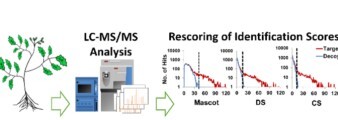
Yet-Ran Chen
Research Fellow
CURRENT POSITION
2024- Research Fellow, Agricultural Biotechnology Research Center, Academia Sinica.
2024- President, Taiwan Society for Mass Spectrometry.
2015- Professor, Biotechnology Center, National Chung Hsing University.
2015- Professor, Institute of Biotechnology, National Taiwan University.
2009- Executive PI of Metabolomics Core Facility, Academia Sinica
PROFESSIONAL EXPERIENCES
2015-2024 Tenured Associate Research Fellow, Agricultural Biotechnology Research Center, Academia Sinica.
2007-2015 Assistant Research Fellow, Agricultural Biotechnology Research Center, Academia Sinica.
2006-2007 Assistant Professor, Dep. of Bioscience and Biotech., National Taiwan Ocean University.
2002-2006 Postdoctoral Research Fellow, Institute of Chemistry, Academia Sinica.
2003 Visiting Scholar, Institute for Systems Biology, Seattle, WA, USA
AWARDS
2025 Outstanding Scholar Award, Foundation for the Advancement of Outstanding Scholarship (FAOS)
2024 Investigation Research Grant/Award, Academia Sinica
2024 Distinguished Scholar Award, Taiwan Society for Mass Spectrometry
2016 Junior Research Investigators Award, National Award by Academia Sinica.
2016 Career Development Award, Academia Sinica.
2015 Professor CY Lin Memorial Award for Innovative Research Program, The Chu-Yung Lin Memorial Foundation and Taiwan Society for Plant Biologists (TSPB).
2015 The Shang-Fa Yang Young Scientist Award, The Shang-Fa Yang Memorial Foundation.
2013 TSMS Young Scholar Award, Taiwan Society for Mass Spectrometry.
2008 Biotechnology Creativity Award, Industrial Development Bureau, Ministry of Economic Affairs.
HONORS
2024- President, Taiwan Society for Mass Spectrometry.
2024 Significant Discovery, Academia Sinica 2023 Yearly Report
2021- Council Member, Taiwan Metabolomics Society.
2016 Significant Discovery, Academia Sinica 2015 Yearly Report
2015 Significant Discovery, Academia Sinica 2014 Yearly Report
2015- Council Member, Asia Oceania Agricultural Proteomics Organization.
2011- Elected Council Member / Executive Council Member (2021-), Taiwan Society for Proteomics.
2006- Elected Council Member / Chair of Publication Committee (2021-) / Executive Council Member (2015-) / Chair of Finance Committee (2015-21) / Academic Committee (2015-) / Training Course Committee (2009-12), Taiwan Society for Mass Spectrometry.

